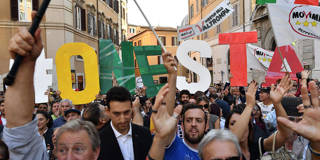One might expect diffuse, grassroots movements that emerge from large-scale street protests to be more inclusive, deliberative, and democratic than traditional political parties. But the proliferation of personality-driven movements on both the right and the left in recent years calls that assumption into question.
PRINCETON – Many people expected the big political story of 2017 to be about the triumph of populism in Europe. But things didn’t turn out that way. Instead, the biggest story was about self-styled “movements” upending or replacing traditional political parties.
Consider French President Emmanuel Macron’s La République En Marche!, which swept the French presidential and parliamentary elections this past spring. Or consider how, at the end of the year, 31-year-old Sebastian Kurz became Chancellor of Austria after refashioning the conservative Austrian People’s Party (ÖVP) into a movement called “The Sebastian Kurz list – The New People’s Party.”
Across the European continent, more voters have come to see traditional political parties as self-interested and power-hungry. In the developing world, too, parties with well-established pedigrees, such as the African National Congress (ANC) in South Africa, are now widely regarded as corrupt. In many cases, traditional parties have become what political scientists call “cartels”: they use state resources to remain in power, and, regardless of their policy differences, they often work together to keep out challengers.

PRINCETON – Many people expected the big political story of 2017 to be about the triumph of populism in Europe. But things didn’t turn out that way. Instead, the biggest story was about self-styled “movements” upending or replacing traditional political parties.
Consider French President Emmanuel Macron’s La République En Marche!, which swept the French presidential and parliamentary elections this past spring. Or consider how, at the end of the year, 31-year-old Sebastian Kurz became Chancellor of Austria after refashioning the conservative Austrian People’s Party (ÖVP) into a movement called “The Sebastian Kurz list – The New People’s Party.”
Across the European continent, more voters have come to see traditional political parties as self-interested and power-hungry. In the developing world, too, parties with well-established pedigrees, such as the African National Congress (ANC) in South Africa, are now widely regarded as corrupt. In many cases, traditional parties have become what political scientists call “cartels”: they use state resources to remain in power, and, regardless of their policy differences, they often work together to keep out challengers.